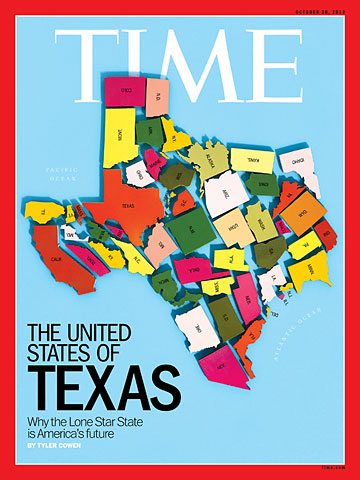
(6 of 9)
Of course, not everyone's a fan of the Texas model. "We are not strong economically because we have low taxes and lax regulation. We are strong economically because of geography and geology," says Scott McCown, a former executive director of the Center for Public Policy Priorities who is now a law professor at the University of Texas. "We've built an economy favoring the wealthy ... If that's the ultimate end result of the Texas model in a democratic society, it will be rejected."
So will the rest of the country follow Texas' lead? People are already voting with their feet. The places in the U.S. seeing significant in-migration are largely in relatively inexpensive parts of the Sun Belt. These are, by and large, affordable states with decent records of job creation--often with subpar public services and low taxes. Texas is just the most striking example. But Oklahoma, Colorado, the Carolinas and other parts of the South are benefiting from the same trends--namely that California, New York and the other high-tax, high-cost states are no longer such good deals for much of the U.S.'s middle and lower-middle classes.
The Americans heading to Texas and other cheap-living states are a bit like the mythical cowboys of our past--self-reliant, for better or worse.
THE NEW COWBOYS
For Americans heading to these places, the likelihood is that they'll be facing slow-growing, stagnant or even falling wages. Yet it won't be the dystopia that it may sound like at first. Automation and globalization don't just make a lot of goods and services much cheaper--they sometimes make them free. There is already plenty of free online education, graded by computer bots, and free music on YouTube. Hulu and related online viewing services are allowing Americans to free up some money by cutting the cable cord. Facebook soaks up a lot of our free time, and it doesn't cost a dime. The near future likely will bring free or very cheap online medical diagnosis.
This suggests that wages and GDP statistics may no longer be the most accurate gauges of real living standards. A new class of Americans will become far more numerous. They will despair at finding good middle-class jobs and decide to live off salaries that are roughly comparable to today's lower-middle-class incomes. Some will give up trying so hard--but it won't matter as much as it used to, because they won't have to be big successes to live relatively well.
"The world of work is changing, and what we are learning is it's no longer about the 9-to-5, it's about the work itself," says Gary Swart, CEO of oDesk, a global job marketplace that sells tools to allow businesses to hire and manage remote workers. "Millennials, they are about how to make an impact ... They want freedom in their lives, and they care more about that than they do the financial rewards."
For an example of one of these "new cowboys," take Joe Swec. For most of his life, Swec, 32, has lived in beautiful (and, he notes, expensive) places. Born in the San Francisco Bay Area, he graduated from California Polytechnic State University with a degree in structural engineering and went to work in Healdsburg, working on the construction and restoration of several Sonoma County wineries. Then he headed south to work in Malibu. But he was not content.
